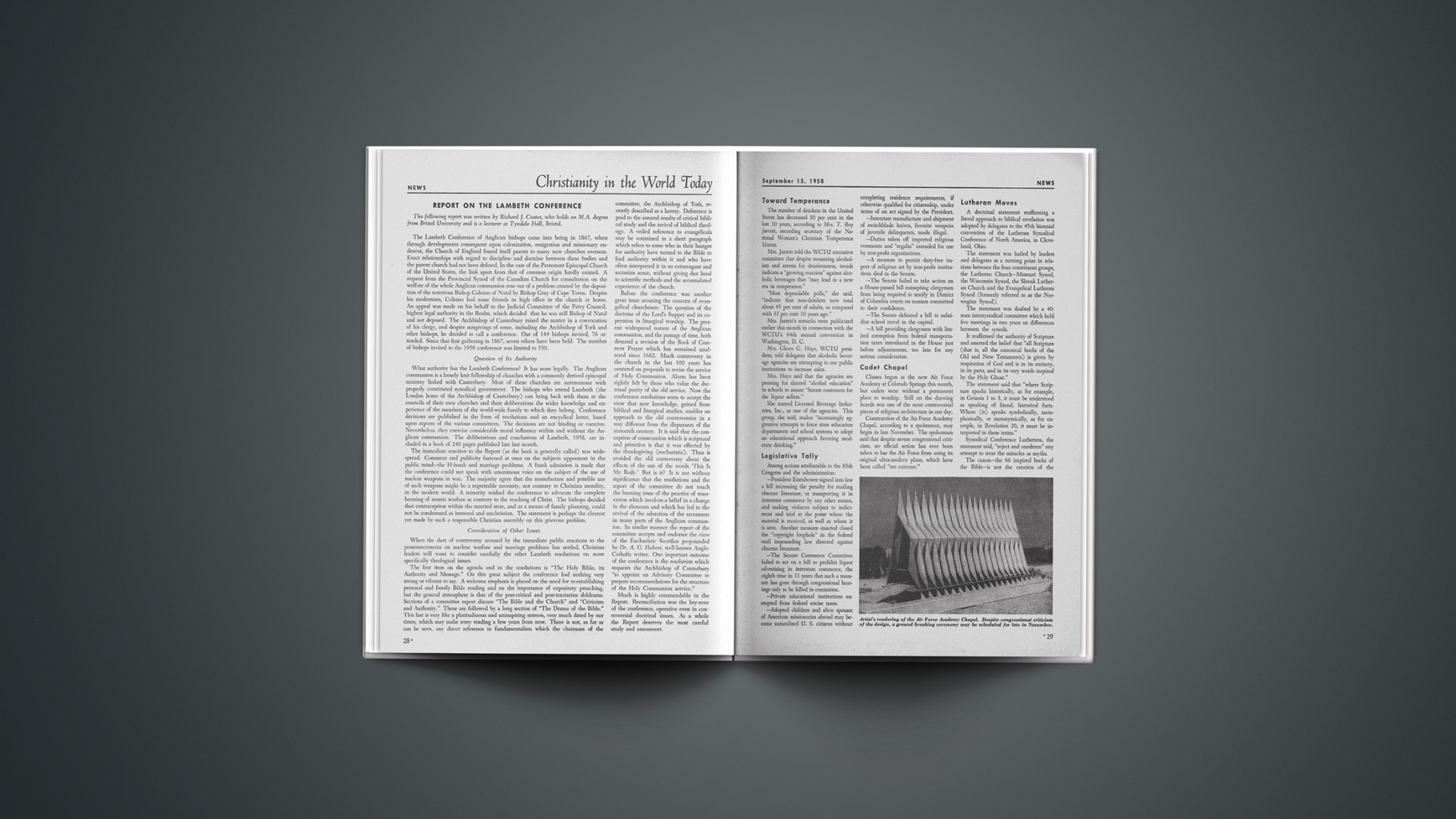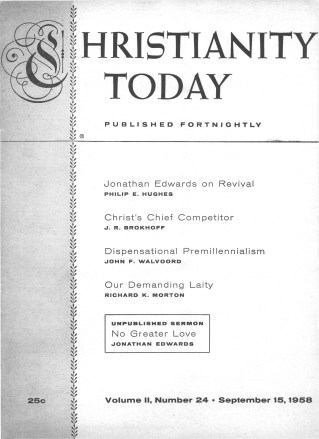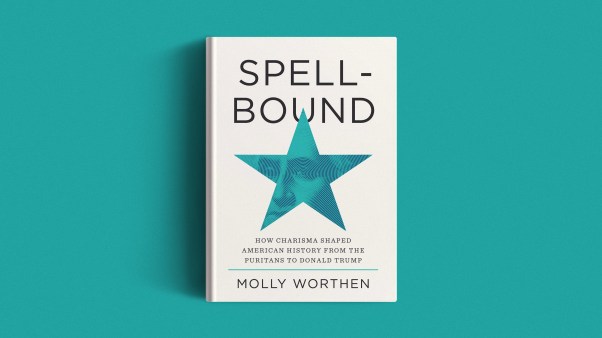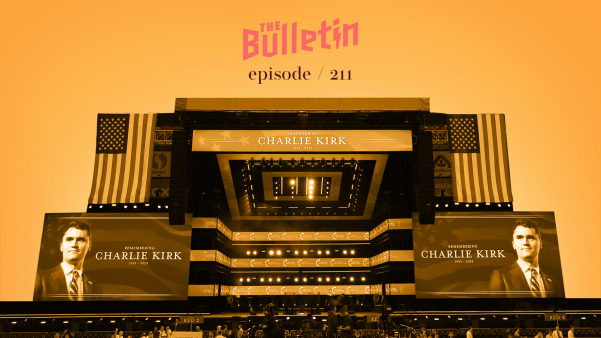NEWS
Christianity in the World Today
The following report was written by Richard J. Coates, who holds an M.A. degree from Bristol University and is a lecturer at Tyndale Hall, Bristol.
The Lambeth Conference of Anglican bishops came into being in 1867, when through developments consequent upon colonization, emigration and missionary endeavor, the Church of England found itself parent to many new churches overseas. Exact relationships with regard to discipline and doctrine between these bodies and the parent church had not been defined. In the case of the Protestant Episcopal Church of the United States, the link apart from that of common origin hardly existed. A request from the Provincial Synod of the Canadian Church for consultation on the welfare of the whole Anglican communion rose out of a problem created by the deposition of the notorious Bishop Colenso of Natal by Bishop Gray of Cape Town. Despite his modernism, Colenso had some friends in high office in the church at home. An appeal was made on his behalf to the Judicial Committee of the Privy Council, highest legal authority in the Realm, which decided that he was still Bishop of Natal and not deposed. The Archbishop of Canterbury raised the matter in a convocation of his clergy, and despite misgivings of some, including the Archbishop of York and other bishops, he decided to call a conference. Out of 144 bishops invited, 76 attended. Since that first gathering in 1867, seven others have been held. The number of bishops invited to the 1958 conference was limited to 350.
Question Of Its Authority
What authority has the Lambeth Conference? It has none legally. The Anglican communion is a loosely knit fellowship of churches with a commonly derived episcopal ministry linked with Canterbury. Most of these churches are autonomous with properly constituted synodical government. The bishops who attend Lambeth (the London home of the Archbishop of Canterbury) can bring back with them to the councils of their own churches and their deliberations the wider knowledge and experience of the members of the world-wide family to which they belong. Conference decisions are published in the form of resolutions and an encyclical letter, based upon reports of the various committees. The decisions are not binding or coercive. Nevertheless, they exercise considerable moral influence within and without the Anglican communion. The deliberations and conclusions of Lambeth, 1958, are included in a book of 240 pages published late last month.
The immediate reaction to the Report (as the book is generally called) was widespread. Comment and publicity fastened at once on the subjects uppermost in the public mind—the H-bomb and marriage problems. A frank admission is made that the conference could not speak with unanimous voice on the subject of the use of nuclear weapons in war. The majority agree that the manufacture and possible use of such weapons might be a regrettable necessity, not contrary to Christian morality, in the modern world. A minority wished the conference to advocate the complete banning of atomic warfare as contrary to the teaching of Christ. The bishops decided that contraception within the married state, and as a means of family planning, could not be condemned as immoral and unchristian. The statement is perhaps the clearest yet made by such a responsible Christian assembly on this grievous problem.
Consideration Of Other Issues
When the dust of controversy aroused by the immediate public reactions to the pronouncements on nuclear warfare and marriage problems has settled, Christian leaders will want to consider carefully the other Lambeth resolutions on more specifically theological issues.
The first item on the agenda and in the resolutions is “The Holy Bible; its Authority and Message.” On this great subject the conference had nothing very strong or vibrant to say. A welcome emphasis is placed on the need for re-establishing personal and family Bible reading and on the importance of expository preaching, but the general atmosphere is that of the post-critical and post-tractarian doldrums. Sections of a committee report discuss “The Bible and the Church” and “Criticism and Authority.” These are followed by a long section of “The Drama of the Bible.” This last is very like a platitudinous and uninspiring sermon, very much dated by our times, which may make sorry reading a few years from now. There is not, as far as can be seen, any direct reference to fundamentalism which the chairman of the committee, the Archbishop of York, recently described as a heresy. Deference is paid to the assured results of critical biblical study and the revival of biblical theology. A veiled reference to evangelicals may be contained in a short paragraph which refers to some who in their hunger for authority have turned to the Bible to find authority within it and who have often interpreted it in an extravagant and sectarian sense, without giving due heed to scientific methods and the accumulated experience of the church.
Before the conference was another great issue arousing the concern of evangelical churchmen: The question of the doctrine of the Lord’s Supper and its expression in liturgical worship. The present widespread nature of the Anglican communion, and the passage of time, both demand a revision of the Book of Common Prayer which has remained unaltered since 1662. Much controversy in the church in the last 100 years has centered on proposals to revise the service of Holy Communion. Alarm has been rightly felt by those who value the doctrinal purity of the old service. Now the conference resolutions seem to accept the view that new knowledge, gained from biblical and liturgical studies, enables an approach to the old controversies in a way different from the disputants of the sixteenth century. It is said that the conception of consecration which is scriptural and primitive is that it was effected by the thanksgiving (eucharistia). Thus is avoided the old controversy about the effects of the use of the words ‘This Is My Body.’ But is it? It is not without significance that the resolutions and the report of the committee do not touch the burning issue of the practice of reservation which involves a belief in a change in the elements and which has led to the revival of the adoration of the sacrament in many parts of the Anglican communion. In similar manner the report of the committee accepts and endorses the view of the Eucharistic Sacrifice propounded by Dr. A. G. Hebert, well-known Anglo-Catholic writer. One important outcome of the conference is the resolution which requests the Archbishop of Canterbury “to appoint an Advisory Committee to prepare recommendations for the structure of the Holy Communion service.”
Much is highly commendable in the Report. Reconciliation was the key-note of the conference, operative even in controversial doctrinal issues. As a whole the Report deserves the most careful study and assessment.
Toward Temperance
The number of drinkers in the United States has decreased 30 per cent in the last 10 years, according to Mrs. T. Roy Jarrett, recording secretary of the National Woman’s Christian Temperance Union.
Mrs. Jarrett told the WCTU executive committee that despite mounting alcoholism and arrests for drunkenness, trends indicate a “growing reaction” against alcoholic beverages that “may lead to a new era in temperance.”
“Most dependable polls,” she said, “indicate that non-drinkers now total about 45 per cent of adults, as compared with 33 per cent 10 years ago.”
Mrs. Jarrett’s remarks were publicized earlier this month in connection with the WCTU’s 84th annual convention in Washington, D. C.
Mrs. Glenn G. Hays, WCTU president, told delegates that alcoholic beverage agencies are attempting to use public institutions to increase sales.
Mrs. Hays said that the agencies are pressing for slanted “alcohol education” in schools to assure “future customers for the liquor sellers.”
She named Licensed Beverage Industries, Inc., as one of the agencies. This group, she said, makes “increasingly aggressive attempts to force state education departments and school systems to adopt an educational approach favoring moderate drinking.”
Legislative Tally
Among actions attributable to the 85th Congress and the administration;
—President Eisenhower signed into law a bill increasing the penalty for mailing obscene literature, or transporting it in interstate commerce by any other means, and making violators subject to indictment and trial at the point where the material is received, as well as where it is sent. Another measure enacted closed the “copyright loophole” in the federal mail impounding law directed against obscene literature.
—The Senate Commerce Committee failed to act on a bill to prohibit liquor advertising in interstate commerce, the eighth time in 11 years that such a measure has gone through congressional hearings only to be killed in committee.
—Private educational institutions exempted from federal excise taxes.
—Adopted children and alien spouses of American missionaries abroad may become naturalized U. S. citizens without completing residence requirements, if otherwise qualified for citizenship, under terms of an act signed by the President.
—Interstate manufacture and shipment of switchblade knives, favorite weapons of juvenile delinquents, made illegal.
—Duties taken off imported religious vestments and “regalia” intended for use by non-profit organizations.
—A measure to permit duty-free import of religious art by non-profit institutions died in the Senate.
—The Senate failed to take action on a House-passed bill exempting clergymen from being required to testify in District of Columbia courts on matters committed to their confidence.
—The Senate defeated a bill to subsidize school travel in the capital.
—A bill providing clergymen with limited exemption from federal transportation taxes introduced in the House just before adjournment, too late for any serious consideration.
Cadet Chapel
Classes began at the new Air Force Academy at Colorado Springs this month, but cadets were without a permanent place to worship. Still on the drawing boards was one of the most controversial pieces of religious architecture in our day.
Construction of the Air Force Academy Chapel, according to a spokesman, may begin in late November. The spokesman said that despite severe congressional criticism, no official action has ever been taken to bar the Air Force from using its original ultra-modern plans, which have been called “too extreme.”
Lutheran Moves
A doctrinal statement reaffirming a literal approach to biblical revelation was adopted by delegates to the 45th biennial convention of the Lutheran Synodical Conference of North America, in Cleveland, Ohio.
The statement was hailed by leaders and delegates as a turning point in relations between the four constituent groups, the Lutheran Church-Missouri Synod, the Wisconsin Synod, the Slovak Lutheran Church and the Evangelical Lutheran Synod (formerly referred to as the Norwegian Synod).
The statement was drafted by a 40-man intersynodical committee which held five meetings in two years on differences between the synods.
It reaffirmed the authority of Scripture and asserted the belief that “all Scripture (that is, all the canonical books of the Old and New Testaments) is given by inspiration of God and is in its entirety, in its parts, and in its very words inspired by the Holy Ghost.”
The statement said that “where Scripture speaks historically, as for example, in Genesis 1 to 3, it must be understood as speaking of literal, historical facts. Where (it) speaks symbolically, metaphorically, or metonymically, as for example, in Revelation 20, it must be interpreted in these terms.”
Synodical Conference Lutherans, the statement said, “reject and condemn” any attempt to treat the miracles as myths.
The canon—the 66 inspired books of the Bible—is not the creation of the church, the statement asserted. “Rather, the canon has, by quiet historical process … in the worship life of the church, imposed itself upon the church by virtue of its own doctrine and authority.”
The report said, however, that “because of our human limitations and frailties, we find ourselves in disagreement as to the scope and application” of Scripture to disputed areas, which include the practical application of the Christian life to scouting, fellowship, unionism, discipline and the military chaplaincy
The Wisconsin Synod at its 1957 convention voted down a proposal to suspend relations with the Missouri Synod. The Evangelical Lutheran Synod has suspended relations with the Missouri Synod, although its delegates attended the Synodical Conference meeting. Both bodies have accused the Missouri Synod of “unionistic” practices, meaning cooperation with groups with which they are not in doctrinal agreement.
Meanwhile, in Seattle, Washington, the 81st annual convention of the 23,000-member American Evangelical Lutheran Church adopted a resolution calling for continued negotiations toward eventual merger with the United Lutheran Church in America, the Augustana Lutheran Church, and the Finnish Evangelical Lutheran Church (Suomi Synod).
Wedding Rings
Communicants can wear wedding rings under action taken by the 47th biennial General Assembly of the Church of God headquartered at Cleveland, Tennessee.
Delegates voted, 918 to 841, to except wedding rings from their traditional condemnation of jewelry. A spokesman at the assembly held in Memphis said the move originated among “young married people who had been put in embarrassment at times by not wearing them.”
New Appointments
Dr. Theodore A. Gill, managing editor of The Christian Century, will become president of San Francisco Theological Seminary in November.
In announcing Gill’s appointment by the board of trustees of the seminary, affiliated with the United Presbyterian Church in the U. S. A., the Century said that one of its contributing editors, Dr. Martin E. Marty, was being elevated to the post of an associate editor. Gill will continue an association with the magazine as a contributing editor.
San Francisco Theological Seminary has been governed by a “president’s cabinet” since the retirement in June, 1957, of the Rev. Jesse Hays Baird.










